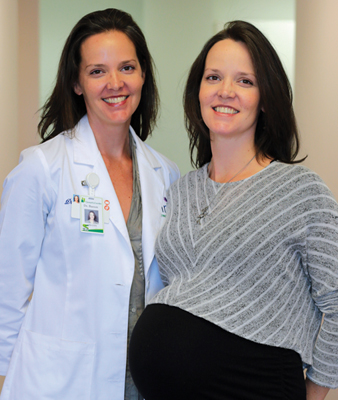All That You Can B
Folic acid is a B vitamin that can help prevent some birth defects
Women know that some of their daily habits will change once they become pregnant, but there is one very simple, and also very important, thing that all women can do before they try to conceive: get enough folic acid. This one addition to their diet can
help prevent neural tube defects, which are birth defects of the brain, spine, and spinal cord.
“I tell my patients that it’s important for them to have folic acid in their diet, ideally before they get pregnant,”
says Maria Paasch, MD. “The formation of the brain and spinal cord generally happens in the first seven weeks of pregnancy, before a woman even knows she’s pregnant.”
Dr. Paasch works with her twin sister, Maryanna
Barrett, MD, at Thrive Obstetrics & Gynecology. Barrett and Paasch are both board-certified OB/GYN doctors.

(Left to right: Maryanna Barret, MD, and her twin sister, Maria Paasch, MD, who was in her third trimester when she spoke with us for this article.)
“We counsel women of childbearing age that aren’t using contraception, whether they are actively trying to conceive or not, to make sure they are taking a prenatal vitamin with folic acid or a folic acid supplement,” Barrett says.
“For women that have decided to attempt conception at a certain time in the future, I tell them that the most recent recommendation is taking folic acid about three or four months prior to conception, so that all of those nutrients are there
when the neurovascular formation starts happening.”
Dr. Barrett and Dr. Paasch note that some prenatal vitamins will use the term folate instead of folic acid. Folate is essentially the same nutrient in a slightly different
biochemical form.
The current recommendation for women of childbearing age is 400 micrograms of folic acid or folate every day. This can change during pregnancy. In some cases, the recommendation can be raised even before conception
for women with a family history of neural tube defects.
“This is why it’s important to know your family history well and share it with your OB,” Barrett says. “We can do counseling and help calculate recurrence
risk. Along with your medical history, we need to know what medications you are taking. Some medical issues that a woman has can increase the risk for birth defects, but in some cases it’s the medication for those issues that can increase the
risk.”
“We may have to increase the folic acid recommendation or see if the medication can be changed,” adds Paasch. “This is why we recommend a pre-conception visit to your OB/GYN, which can usually be part of your annual
gynecological exam.”
Difficult Discussions for a Healthy Pregnancy
Though Dr. Paasch is a Board-certified OB/GYN, she still had to have frank discussions with her OB during her most recent pregnancy about vaccinations, induction, and other concerns. It may have helped that her OB is her twin sister, Dr. Barrett.
But both doctors are aware that with any patient, a difficult topic may need to be addressed. One of the most sensitive subjects is obesity.
“Every woman who is obese knows it’s a problem for her health,” Barrett says.
“But it may not be widely understood that obesity increases risks in pregnancy, including birth defects.”
“As a doctor, it’s my job to inform women of the facts,” Paasch says. “It would be unfair of me
not to tell you when your weight gain is bad for your pregnancy.”
Both doctors have treated patients who understood that they had to quit smoking or drinking alcohol once they learned they were pregnant, but sometimes found that those
same women were not exercising or adapting their diet.
“Fatty, sugary foods that are mostly calories and have little nutritional value can be as bad or worse than a glass of wine,” Barrett says.
“Sometimes it
can be hard for a patient to hear about changing their diet or maintaining an appropriate weight,” Paasch says. “But the fact is that doing those things prior to conceiving will help you have a healthier, safer pregnancy.”